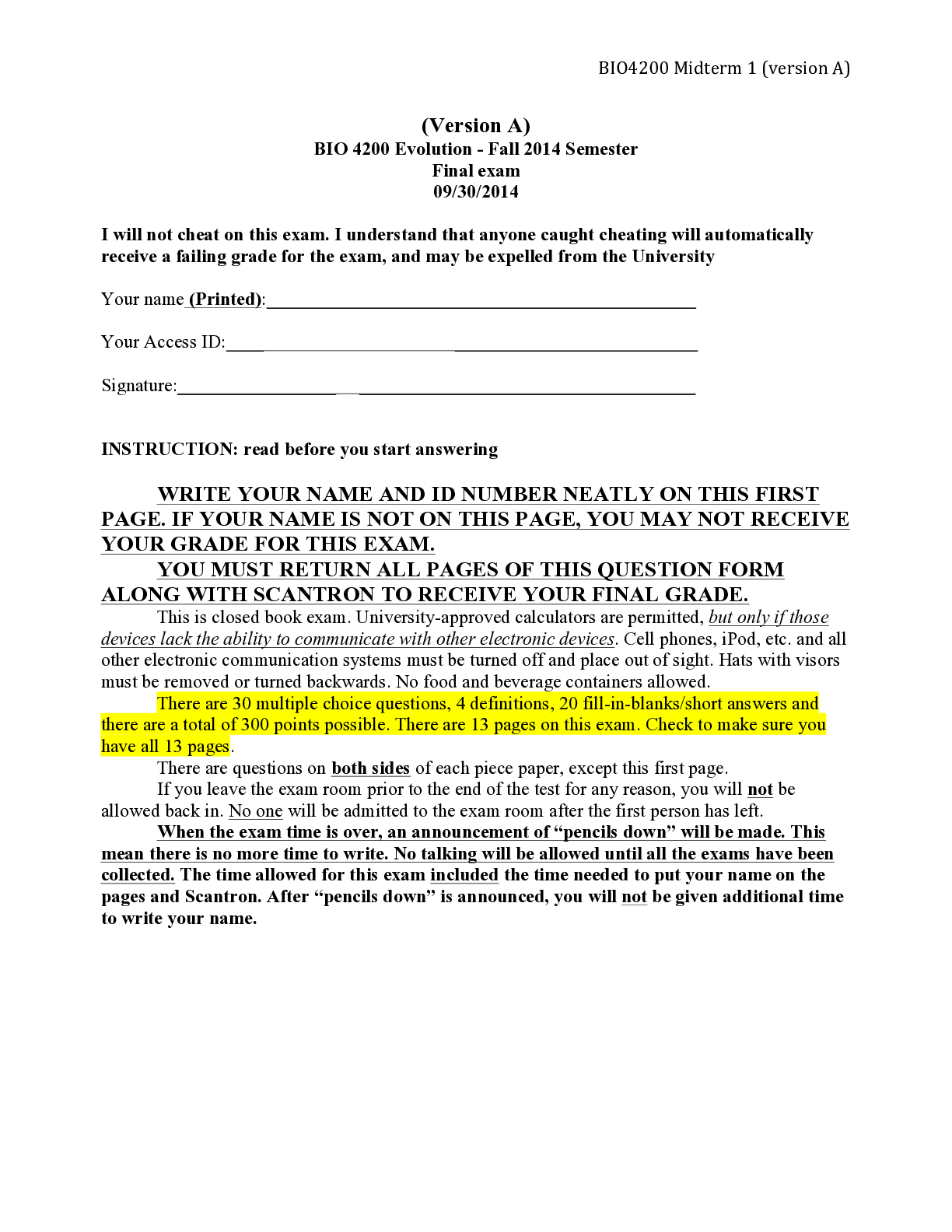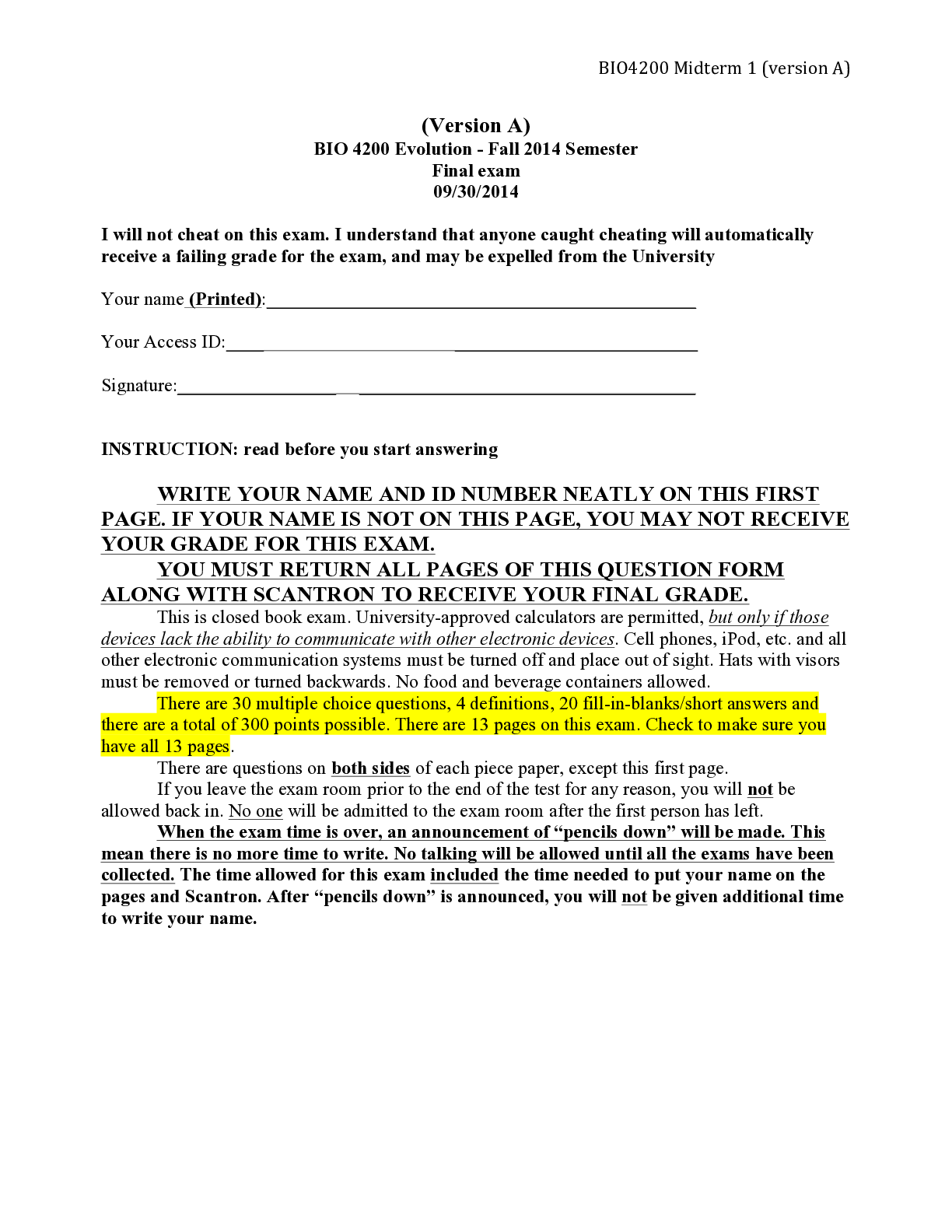I will not cheat on this exam. I understand that anyone caught cheating will automatically
receive a failing grade for the exam, and may be expelled from the University
Your name (Printed):______________________________________________
Your Access ID:____ __________________________
Signature:_________________ ____________________________________
INSTRUCTION: read before you start answering
WRITE YOUR NAME AND ID NUMBER NEATLY ON THIS FIRST
PAGE. IF YOUR NAME IS NOT ON THIS PAGE, YOU MAY NOT RECEIVE
YOUR GRADE FOR THIS EXAM.
YOU MUST RETURN ALL PAGES OF THIS QUESTION FORM
ALONG WITH SCANTRON TO RECEIVE YOUR FINAL GRADE.
This is closed book exam. University-approved calculators are permitted, but only if those
devices lack the ability to communicate with other electronic devices. Cell phones, iPod, etc. and all
other electronic communication systems must be turned off and place out of sight. Hats with visors
must be removed or turned backwards. No food and beverage containers allowed.
There are 30 multiple choice questions, 4 definitions, 20 fill-in-blanks/short answers and
there are a total of 300 points possible. There are 13 pages on this exam. Check to make sure you
have all 13 pages.
There are questions on both sides of each piece paper, except this first page.
If you leave the exam room prior to the end of the test for any reason, you will not be
allowed back in. No one will be admitted to the exam room after the first person has left.
When the exam time is over, an announcement of “pencils down” will be made. This
mean there is no more time to write. No talking will be allowed until all the exams have been
collected. The time allowed for this exam included the time needed to put your name on the
pages and Scantron. After “pencils down” is announced, you will not be given additional time
to write your name.
1
Part%A.%Multiple%Choice,%please%identify%the%best%answer%for%each%question%%(30 questions,%4
marks%each,%in%total%120 marks)
1. Which of the following enzymes is responsible for transcribing viral RNA into DNA?
A. RNA polymerase
B. reverse transcriptase
C. DNA polymerase
D. reverse integrase
E. RNA duplicase
2. In response to environmental conditions, the average beak size in a population of birds may
change between successive generations. This process of change is referred to as ________.
A. macroevolution
B. sequestration
C. speciation
D. coalescence
E. microevolution
3. Natural selection ________.
A. works on populations, but its long-term effect is rendered on individuals
B. works on individuals, but its long-term effect is rendered on populations
C. can work only on populations of genetically identical individuals
D. works regardless of the amount of genetic variability in populations
E. works on populations, but may only work on limited populations
4. A novel, derived character is also referred to as a(n) ________.
A. apomorphy
B. plesiomorphy
C. synapomorphy
D. clade
E. homoplasy
5. A hypothetical population has two alleles for a gene: A and a. In a random sample of 50
individuals, 20 are homozygous for a, 20 are homozygous for A, and 10 are heterozygous. What is
the frequency of A?
A. 20%
B. 40%
C. 50%
D. 60%
E. 80%
6 Every (internal) node in a phylogenetic tree represents a(n) ________.
A. common ancestor
B. extinction event
C. transitional form
D. sister species
E. brother species
2
7. In terms of the Hardy-Weinberg equilibrium, genetic drift results from a violation of ________.
A. the random mating assumption
B. the lack of natural selection assumption
C. the infinite population size assumption
D. the lack of mutation assumption
E. the lack of migration assumption
8. Nonrandom mating ( does not ), by itself, alter allele frequencies. It ( is not ), therefore, a
mechanism of evolution.
A. A: does; is
B. B: does; it not
C. C: does not; is
D. D: does not; is not
E. E: none of above
9.'Refer'to'the'codon'table'below.''
Which'of'the'following'involves'a'synonymous'mutation?
A. UGA → UGG
B. GAU → GAA
C. UUA → CUA
D. GGA → CGA
E. CAG → AUG
10. In response to environmental conditions, the average beak size in a population of birds may
change between successive generations. This process of change is referred to as ________.
A. macroevolution
Read More


